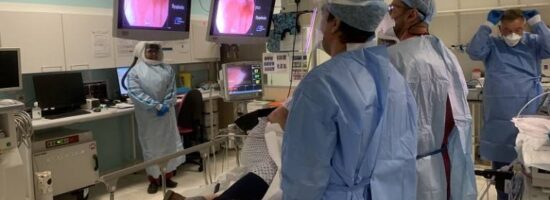Spinout News
Detecting oesophageal cancer with AI
2 July 2021

Experts at UCL and spinout company Odin Vision working with clinicians at UCLH have used artificial intelligence (AI) to help detect early signs of oesophageal cancer.
The first procedure in the world using the AI technology was performed at University College Hospital by UCLH consultant gastroenterologist Dr Rehan Haidry. The system, called CADU, uses AI to support doctors in identifying cancerous tissue.
CADU achieved regulatory approval at the start of 2021 making it the first medical device using AI for oesophageal cancer to be CE and UKCA approved for use on patients.
It has been developed in collaboration with UCL scientists, including Dr Haidry, who is also Associate Professor at UCL, and Odin Vision, a spinout formed out of the research and innovation work at the UCL Wellcome / EPSRC Centre for Interventional and Surgical Sciences.
Peter Mountney, Odin Vision CEO and Honorary Associate Professor, UCL Computer Science, said: “AI has great potential to transform healthcare. We are very excited to achieve this landmark procedure and use our AI technology to support doctors in the fight against one of the most aggressive forms of cancer.”
Odin Vision has previously received support from the UCL Technology Fund and was also one of the first spinouts to arise from Portico Ventures, a UCLB commercialisation model designed to help UCL researchers set up technology-based businesses that can thrive in a fast-moving ecosystem.
Dr Anne Lane, CEO of UCL Business, said: “This milestone for Odin Vision’s oesophageal cancer detection system demonstrates the huge potential of UCL research to change lives through its successful commercialisation. We are proud to have supported Odin Vision from its early stages through the UCL Technology Fund and are excited to see what the future holds.”
Read the full announcement at UCL news.
Image
CADU. Credit: Odin Vision.
Further information:
The Guardian: AI software may help spot early signs of oesophageal cancer